
Becca Schimmel
Staff writer
Threatening the safety and freedom of the Internet brought attention to online petitions and students.
The Stop Online Piracy Act is no longer being reviewed. However, the Protect (IP) Act is still under consideration.
PIPA does not penalize for any false claims that a copyright holder makes. Anyone claimed to be violating PIPA and later proved innocent of those claims still has to suffer from court costs.
These bills are designed to block access to unauthorized websites that contain stolen copyrighted material. The idea behind these bills is to stop intellectual American property from being stolen by foreign countries.
Europe has a version of these bills called anti-counterfeiting trade agreement. It has been met with controversy and protests. ACTA was discussed with little inclusion of the public.
The Internet is free and many people would like to keep it that way. However, there are problems of piracy and companies are losing money over file sharing.
“I think (SOPA/PIPA) encouraged a lot of people to sign online petitions but not necessarily become more politically involved.” John Eads, junior from Somerset, Ky., said. “Try to take away our social security or health care and no one says anything but mess with the Internet and it’s on.”
There were online petitions and Facebook received quite a bit of attention via personal statuses and other posts.
Thirty websites participated in a black out by shutting down their websites for a day. A few of these included Wikipedia, Google and Craigslist.
The Internet has always been a place where people have been able to share media files as well as ideas privately and publicly.
SOPA could be an encouragement for many college age students to begin to involve themselves in politics.
“People should be able to post what they want on the Internet,” Dani Hayden, freshman from Pacific, Mo., said.
After the hacking group known as Anonymous was credited with hacking the CIA’s website, the consideration of the bills were put off.
A few websites have already been taken down by their owners due to copyright infringement and their owners have been arrested. Megaupload is one of the file sharing websites taken down.
Anonymous responded directly following the take down of Megaupload by shutting down websites including, justice.gov, universal music and other websites belonging to the FBI and The White House.
The Author of the SOPA bill is Rep. Lamar Smith (R-Texas). A few representatives began to pull their support from the bill when the public outcry against censorship was heard.
“I have heard from the critics and I take seriously their concerns regarding proposed legislation to address the problem of online piracy,” Smith said. “It is clear that we need to revisit the approach on how best to address the problem of foreign thieves that steal and sell American inventions and products.”
SOPA has been cast aside until a wider agreement can be reached. However, Congress is still considering it a problem that needs to be dealt with.
The concern lies with the theft of American intellectual property.
Visit google.com/takeaction for more information.